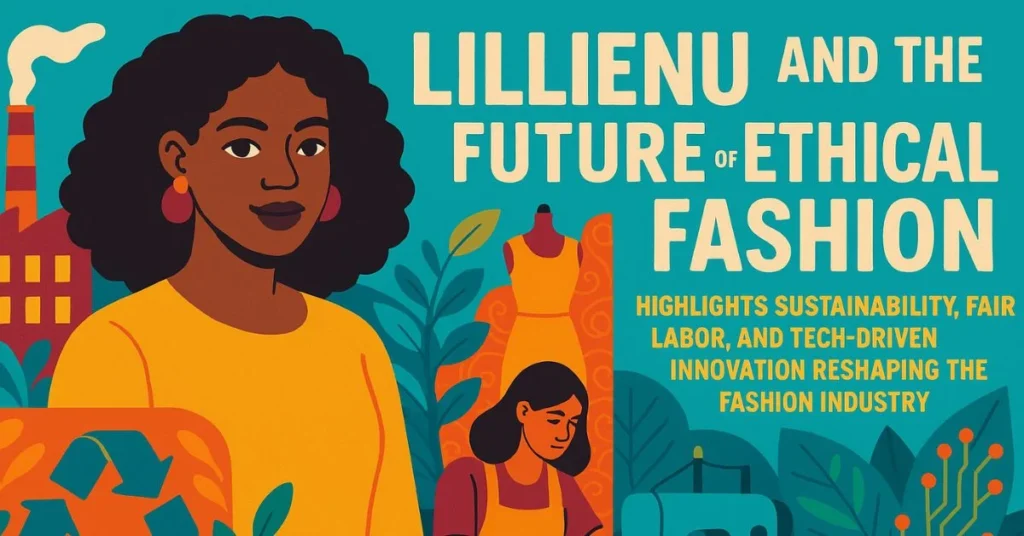Introduction
In a world where fast fashion has long dominated the industry, a new wave of thought is emerging—one that embraces sustainability, ethical production, and conscious consumerism. Ethical fashion goes beyond trends and aesthetics; it represents a commitment to the environment, fair labor practices, and a more mindful approach to clothing production and consumption. As we set our sights on the future, brands like Lillienu are reshaping our perspective on what it means to be stylish while being sustainable. Whether you’re new to the concept or a seasoned advocate for green fashion, this article dives into the dynamic world of ethical fashion and how Lillienu is leading the charge.
What is Ethical Fashion?
Ethical fashion is a movement that seeks to ensure that the products we wear are made in a manner that minimizes environmental impact and maximizes social benefit. This includes using eco-friendly materials, renewable energy during production, and guaranteeing fair wages and safe working conditions. By prioritizing ethical standards, the industry is moving away from exploitative practices and toward a model that values transparency and sustainability.
The Rising Trend of Sustainability in Fashion
Sustainability is no longer a buzzword—it’s a necessity. Rising global awareness of environmental issues and social injustice has prompted consumers and companies alike to rethink their choices. The traditional model of rapid production and quick turnover is giving way to a focus on quality, durability, and respect for the planet. Today, consumers are not just buying a piece of clothing; they are investing in a promise of ethical integrity and environmental responsibility.
Understanding Lillienu
Brand Origins and Philosophy
Lillienu was born from a desire to change the fashion landscape for the better. The brand’s story begins with passionate founders who were deeply concerned with the negative impacts of conventional fashion. They envisioned a brand that would challenge the status quo by integrating ethical practices into every stage of production. This commitment is evident in every fabric, design, and product detail—each one representing a step towards a cleaner, more equitable world.
Core Values and Vision
Central to Lillienu’s ethos are core values that influence all its operations:
- Sustainability: Using eco-friendly methods and materials.
- Transparency: Open communication about sourcing and ethics.
- Fairness: Respect and equity for every worker.
- Innovation: Investment in sustainable technology.
These values distinguish Lillienu and inspire broader industry change.
Ethical Fashion in the Modern Era
The Impact of Fast Fashion on the Environment
Fast fashion, while cheap and trend-driven, has a devastating ecological footprint. From resource exploitation to pollution, it contributes significantly to environmental degradation. Chemicals used in fabric dyeing, energy-intensive manufacturing, and waste generation make fast fashion unsustainable and ethically questionable.
Shifting Consumer Priorities
Consumers today are more informed and demand accountability. They look for transparency, quality, and ethical responsibility in the brands they support. This shift influences global purchasing behavior and aligns with Lillienu’s commitment to sustainable storytelling.
Sustainable Practices at Lillienu
Materials and Sourcing
Eco-Friendly Fabrics
Lillienu uses natural and recycled fibers such as organic cotton, hemp, bamboo, and recycled polyester. These materials meet strict sustainability standards and reduce the environmental footprint.
Fair Trade Sourcing
The brand partners with suppliers who follow fair labor practices. From farmers to factory workers, everyone is recognized and fairly compensated, creating a supply chain rooted in social justice.
Production and Manufacturing
Energy Efficiency and Waste Reduction
Lillienu’s production lines use modern, energy-saving technologies and waste recycling systems to minimize their carbon footprint.
Local vs. Global Production Impacts
By supporting local artisans and reducing global transport, Lillienu enhances community development and decreases emissions, balancing local benefits with broader global strategies.
The Intersection of Technology and Ethical Fashion
Digital Innovation in Sustainable Fashion
Technologies such as 3D modeling, AI-driven design, and virtual try-ons allow for more efficient production and less waste. These innovations help brands like Lillienu meet sustainability goals while enhancing creativity.
Transparency Through Blockchain and Data
Lillienu employs blockchain to trace each garment’s journey from raw material to final product. This builds trust and allows consumers to verify sustainability claims. Data analytics further improve operational efficiency and responsiveness to trends.
Community and Collaboration
Partnerships with Eco-Conscious Organizations
Lillienu partners with non-profits and fair trade advocates to amplify its message and impact. These collaborations promote environmental and social responsibility across the industry.
Engaging Consumers in the Sustainability Movement
Through campaigns, events, and educational content, Lillienu invites customers to participate in sustainability. This engagement turns shoppers into active change-makers.
The Future of Ethical Fashion
Trends to Watch in the Coming Years
- Circular Fashion:
Emphasizing reuse and recycling of materials to reduce waste. - Innovative Materials:
Development of sustainable fabrics that match traditional textiles in performance and style. - Customization and Made-to-Order:
Catering to individual needs while minimizing overproduction. - Enhanced Transparency:
Widespread use of blockchain to prove ethical practices. - Consumer Empowerment:
Consumers are increasingly pushing brands to walk the talk on sustainability.
The Role of Education and Advocacy
Lillienu spreads knowledge through workshops, webinars, and partnerships with educational institutions. These initiatives build a generation of mindful consumers and designers who will carry the ethical fashion torch forward.
Challenges and Opportunities
Overcoming Obstacles in the Ethical Fashion Industry
- Cost Barriers:
Sustainable production can be more expensive. - Scalability:
Moving ethical fashion from niche to mainstream requires resources. - Regulatory Hurdles:
Global inconsistencies in laws complicate standardization. - Consumer Skepticism:
While interest is high, actual commitment remains a hurdle.
Lillienu addresses these issues with innovation, partnerships, and customer education.
Seizing New Market Opportunities
- Expanding Product Lines:
Lillienu is exploring accessories, footwear, and ethical beauty products. - Global Partnerships:
Collaborations with international designers and influencers expand its reach. - Community-Driven Initiatives:
Platforms for feedback foster loyalty and transparency. - Investment in Technology:
Adopting digital tools improves efficiency and reinforces sustainability.
Conclusion
Lillienu exemplifies what’s possible when creativity and responsibility unite. From ethical sourcing to technological integration, the brand is setting benchmarks in the fashion world. Its story is one of innovation and care, reminding us that every choice matters.
As consumers grow more conscious, the line between style and sustainability fades. Lillienu is not just a brand—it is a movement toward a greener, fairer world. By supporting ethical fashion, we participate in a revolution that benefits people and the planet alike.
FAQs
What makes ethical fashion sustainable?
Ethical fashion uses eco-friendly materials, fair labor, and transparent supply chains to minimize harm and promote social equity.
How does Lillienu ensure eco-friendly production?
By using sustainable fabrics, energy-efficient processes, and partnerships with fair-trade suppliers, Lillienu maintains high ethical standards.
Can consumers influence industry trends?
Yes. Informed buyers drive demand for sustainable products, prompting brands to adopt responsible practices.
What role does technology play in ethical fashion?
Tools like blockchain and AI enhance transparency and reduce waste, making ethical practices more efficient and effective.
Where can one find more ethical fashion brands?
Look for eco-focused platforms, ethical fashion directories, and social media communities that promote sustainable living.






